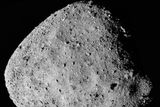Now Reading: Asteroid Bennu’s Tiny Particles Unlock Secrets of Solar System’s Origins
-
01
Asteroid Bennu’s Tiny Particles Unlock Secrets of Solar System’s Origins
Asteroid Bennu’s Tiny Particles Unlock Secrets of Solar System’s Origins

Rapid Summary
- Asteroid Bennu is a 4.5 billion-year-old near-Earth asteroid whose samples have been returned for research by NASA’s OSIRIS-REx mission. Teh spacecraft collected samples in 2020 and delivered them to Earth in 2023.
- Three studies published in Nature Astronomy and Nature Geoscience explore Bennu’s formation, water-rich mineral composition, and surface weathering history.
- Findings indicate that Bennu consists of fragments from a larger parent asteroid, which formed in the outer solar system and broke apart due to collisions. The parent itself was composed of diverse materials, including stardust predating the Solar System.
- Water-related chemical reactions were confirmed as minerals in Bennu’s parent asteroid interacted with melted icy material under heat conditions caused by asteroid formation or radioactive decay. Around 80% of these minerals hold water within their structure today.
- Continual space weathering has been observed on Bennu via micrometeorite impacts and exposure to solar wind, leaving microscopic craters visible on its surface particles.
Indian Opinion Analysis
The insights derived from Asteroid Bennu serve as an critically important milestone for planetary science,offering researchers a glimpse into conditions prevalent during the Solar System’s infancy over four billion years ago.For India-a nation increasingly committed to space exploration-this research demonstrates how studying celestial bodies can yield significant information about cosmic history while pushing technological limits through complex missions like sample returns.
The findings from missions such as OSIRIS-REx can provide valuable frameworks for India’s own space agency ISRO (Indian Space Research Organisation), especially as it advances its lunar programs like Chandrayaan or explores prospects of deep-space explorations beyond Earth’s orbit.
























